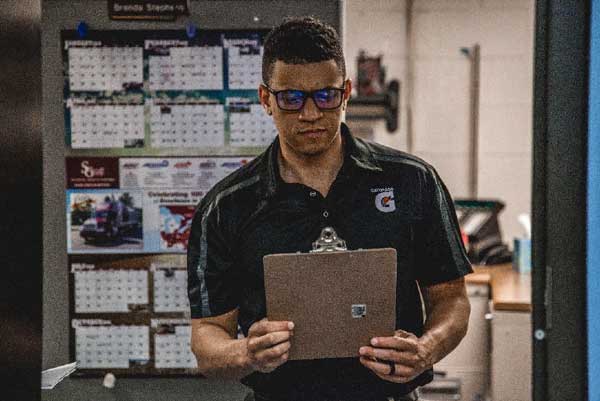No matter the size, all companies plan when they produce products. Planning maximizes human resources, equipment and ingredients.
It takes time to make productive production plans, but they are essential for any manufacturing facility. Here are just a few of the advantages to production planning:
- Delivering products on time
- Reduced labour costs
- Optimized equipment usage and increased capacity
Sounds like some great advantages! That’s why there is a job just for planning production runs in production facilities.
Who actually does the planning? Production Planners! These professionals ensure that products are made on time with high efficiency.
Production Planners plan production schedules

Production planners create production schedules for manufactured goods. Production schedules are plans for individual products to be produced in a certain time period. Some factors that these schedules consider include customer demands, the amount of materials needed and how much labour is required. An example of a simple production schedule is scheduling to produce product A for three days a week and product B for four days a week.
Production planners monitor the execution of these schedules and resolve any potential issues in a timely fashion. Production informs them of any setbacks so they can reorganize the schedule if necessary.
Production planners prepare production schedules based on customer demands, raw material availability and production capacity. To create schedules, they use demand planning software and work with upper management. Planners consult with other departments such as sales and marketing to determine how much product is required.
Finally, planners maintain reports for production planning activities by comparing how much time they predicted would be needed versus how much time was required.
Production Planners forecast trends
One of the most difficult tasks for a production planner is forecasting how much product needs to be made. This isn’t always easy because no one can see into the future. So how do planners actually make these predictions? They take into consideration the following factors:
- Historical sales trends and seasonal trends
- Market demands
- Potential future trends
- The budget of the company (i.e. labour costs, materials)
Using these considerations, they make educated guesses as to what the company will need and plan the best they can.
Production Planners have degrees in business or supply chain management
It is not uncommon for production planners to have bachelor’s degrees in business, engineering, supply chain management or statistics. Alternatively, there are some companies who hire individuals who have college diplomas in business administration, operations management and supply chain management.
However, having a post-secondary degree is not an absolute requirement for this profession. Many individuals only have a high school diploma or equivalent. These individuals generally have experience as a worker within the company and work their way up. This gives them insight into how things work in a manufacturing plant. Keep in mind, though, that having an advanced knowledge of MS Excel is a must for this job.
Production Planning requires a high amount of collaboration
Production planning is a highly collaborative job which involves communicating with many different departments. For example, planners work with marketing or business when estimating how much product is needed for a promotion. These professionals work closely with plant managers to determine production orders. Those that they collaborate with vary, depending on the size of the company.
Production Planners strive to make good production plans
Companies constantly focus on simplifying business processes. Over time, they gain more experience and listen to the needs of production workers, allowing them to simplify and group processes. Here are some key factors that good production planners consider when scheduling:
- Customer demands – estimating the future potential scales of a product
- Inventory – how much raw ingredients they have in a building
- Human resources and equipment – how many people are available to work and the amount of equipment in a facility
Production Planners prepare production reports
Manufacturers use production reports to keep track of essential information used in manufacturing. These reports include:
- The product being produced
- The target amount
- How much labour was used to create it
- How much down time there was
These reports generate manufacturing metrics such as:
- On-time delivery to commit – The percentage of time that manufacturing delivers a completed product on the schedule that was committed to customers.
- Time to make changeovers – Measures the speed or time it takes to switch a manufacturing line or plant from making one product over to making a different product.
These metrics are powerful tools because they help businesses determine where they are doing well and where to make improvements. Production planners prepare reports that include all this information for upper management and suggest ways to improve efficiency.
Production Planners troubleshoot
Problems that nobody expects can arise in manufacturing. Even if these problems are solved, there is time spent between the time a problem was identified and when it was solved. This means that the time in between is wasted, which poorly impacts production schedules.
Production planners must be prepared for problems to occur. One way they combat wasted time is by creating revised production schedules in the event of problems such as design changes, labour or material shortages and backlogs. They devise alternative schedules by collaborating with management, marketing, sales, production, or engineering teams.
Production planners prioritize, manage their time and stay organized
Being a production planner requires a wide range of skills. However, there are a few which are more essential than others. These skills include:
- Prioritization – Not all tasks are of equal importance. Prioritizing tasks means looking at the big picture and determining what tasks require immediate attention. Effective prioritization makes the very best use of resources and labour. Production planners use this skill daily when deciding the production order of products.
- Time management – This skill goes hand-in-hand with the previous skill. Being able to effectively manage your time requires you to plan and control your time. It takes experience and skill to know how long something will take to complete. Production planners use this skill to carry out their production schedules.
- Organization skills – Defined as making use of your time, energy and resources in an effective manner. Unorganized production planners lead to unorganized production facilities.



